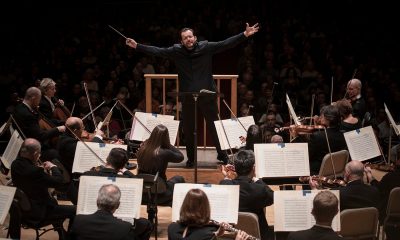The city of Boston is a hub for history, sports and the arts. Notably, it’s home to the Boston Symphony Orchestra — a Grammy Award-winning ensemble that has garnered international recognition.

Behind every crescendo and staccato is a musician who went through competitive auditions and training to earn their seat on the stage. And Boston University alumni are certainly in the mix.
Todd Seeber earned his bachelor’s of music from BU in 1985. Now, he is a double bass player in the BSO.
“If you’re talking about the BSO, you’re playing the greatest repertoire ever written,” he said, “in one of the greatest orchestras ever. Every week is fantastic.”
Seeber joined the Orchestra in 1988 — just three years after graduating.
Despite the intensity of the job, Seeber said he enjoys the “communal experience” with his colleagues, learning new music and mastering his repertoire.
He said he still remembers his BSO audition, which he compared to the rigor and focus of an Olympic athlete — playing at the highest level, but having to remain composed.
“What I remember is being almost a little unemotional during the process because there’s so much you have to remember to do,” he said. “It’s about actually going into that spot in your brain where you can focus.”
Seeber was a student in the BU Tanglewood Institute — a summer principal training program for musicians aged 14-20 — where he now teaches.
“Going to a place like Tanglewood, going to a conservatory or a great university with a high-end performance program, you get a sense of how good you’re going to have to be,” he said. “You have to develop that level of playing … it takes unbelievable amount of work at that period in your life, unbelievable amount.”
Gregory Melchor-Barz, the director of the BU School of Music and a professor of ethnomusicology, said BUTI is one the country’s best programs for young artists — if not the best.
“It’s another part of the equation of getting younger and younger students involved in orchestral playing and developing those skills,” he said, “and hopefully inculcating sort of a lifelong passion for the arts, specifically regarding larger ensembles.”
Melchor-Barz said BU and BSO have formed an “organic” relationship that has allowed some of the orchestra’s talent to be faculty members at the School of Music.
“We have been fortunate to have our students mentored and educated by some of the best musicians in the world,” he said. “The BSO is just one of the finest orchestras in the country that has celebrated our students by accepting them into their ranks.”
James Cooke earned his master’s of music at BU in 1984, and is another alumnus who was able to successfully audition for the BSO — but his audition experience was not one and done.
Cooke began playing violin in fourth grade, he said, and by the time he was a junior in high school, he knew he wanted to pursue music as a profession.
“I certainly was no prodigy,” he said. “I simply worked hard, I think I had an innate musicianship, but it took me a long time to polish my playing.”
After graduating with his master’s, Cooke began freelancing and auditioning — along with his wife Lisa Crockett, a fellow BU student at the time and violinist — around Boston, which he said was “extremely stressful.”
“You cannot get worn down by not being successful, you have to be able to work harder and sort of have a memory for what you need to work on,” he said. “You have to be able to forget if you got nervous or if something didn’t happen the way you wanted it to happen.”
For Cooke, the third time he auditioned for BSO really was the charm.
“I’ve worked very hard, and I was fortunate enough to get into BSO,” he said. “Auditions are a very strange thing, you can never quite predict what’s going to happen. And I was very blessed.”
Even after more than 30 years, he said the orchestra’s magic has never faded.
“I still enjoy it very much,” he said. “It is work, but it’s been a very fulfilling experience for me.”
Melchor-Barz said the School of Music remains committed to its curriculum that helps prepare students for a professional career, including education in large ensemble performance, section leadership and chamber music.
“They’re just getting so many opportunities, both at the undergraduate and the graduate level, to succeed not only in their degree programs, but also preparing them for their next step,” he said. “Many young students come here because they’re thinking they’re not quite ready, but by the time they’re done with their degree program, they’re ready to launch.”
Seeber said his education at BU certainly prepared him for his professional career. He added that the industry is much more competitive now than when he was auditioning 30 years ago, but having “musicianship and artistry” is key to success.
“I think people have to be an artist first and let the technique develop to keep up with your vision for what you’re doing,” he said. “Being technically perfect without being artistically compelling won’t get you the job.”


























































































































